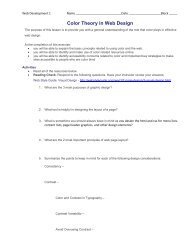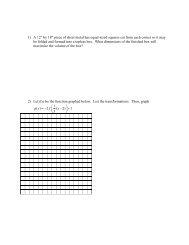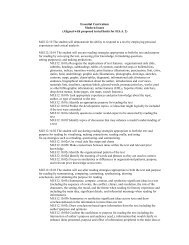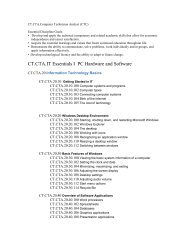Always changing & growing up - P&G School Programs
Always changing & growing up - P&G School Programs
Always changing & growing up - P&G School Programs
You also want an ePaper? Increase the reach of your titles
YUMPU automatically turns print PDFs into web optimized ePapers that Google loves.
<strong>Always</strong> <strong>changing</strong> &<br />
<strong>growing</strong> <strong>up</strong><br />
<strong>Always</strong> Changing ®<br />
Boy’s Guide
Questions<br />
about puberty?<br />
Try talking with your dad<br />
… or with another adult you trust, like your older<br />
brother, grandfather, uncle, mom, coach, doctor<br />
or nurse.<br />
Asking questions about “private stuff” isn’t always easy,<br />
but here are some tips that might help:<br />
Remember, it’s normal to feel awkward or embarrassed.<br />
If your dad seems busy, just say, “There’s something I’d<br />
like to ask you about when you have time.” This way you<br />
won’t keep putting off the discussion.<br />
You don’t have to learn everything at once. One question<br />
at a time is a great way to start.<br />
Show your dad or other trusted adult this booklet, and ask<br />
him to look through it with you.<br />
Contents<br />
What’s happening? 4<br />
Growing <strong>up</strong> and out 6<br />
Feeling good in your skin 10<br />
Healthy hair 12<br />
No sweat! 14<br />
The way it works 16<br />
Glossary 22<br />
2 3
What’s<br />
happening?<br />
This is a booklet about <strong>growing</strong> <strong>up</strong>.<br />
Now that you’re <strong>growing</strong> <strong>up</strong>, you’ll<br />
probably notice that your body is<br />
<strong>changing</strong> in all sorts of ways. You’ll<br />
notice changes in the way you look and<br />
also in the way you feel. This is because<br />
you’re going through a stage called<br />
puberty. This is an exciting time – it’s<br />
when you start to change from being a<br />
boy to becoming a man.<br />
Puberty for boys usually starts<br />
between the ages of 10 and 17,<br />
and lasts for a few years.<br />
Everyone is different, though, and<br />
it doesn’t matter when you start<br />
– your body will decide when the<br />
time is right.<br />
Don’t<br />
worry<br />
These changes won’t suddenly<br />
happen overnight. You’ll notice<br />
that some happen quickly, but<br />
others take place slowly over<br />
a few years.<br />
New words?<br />
All the words in orange<br />
bold type are defined in<br />
the glossary on pages<br />
22 and 23.<br />
This booklet will tell you about<br />
all the changes to expect during<br />
puberty. It will also answer many<br />
of the questions you might want<br />
to ask. Just remember that puberty<br />
is a normal and healthy part of<br />
life – and it happens to everyone!<br />
4 5
Growing<br />
<strong>up</strong> & out<br />
Puberty starts when a gland just beneath the front of your brain – the<br />
pituitary gland – sends a signal for your body to start making some special<br />
chemicals. One of these chemicals – or hormones – is called testosterone,<br />
and it is produced in your testicles. Testosterone is responsible for many<br />
of the changes that are beginning to happen. Females have a different<br />
hormone responsible for their body changes. It’s called estrogen.<br />
You’ll know you are starting to go through puberty when you suddenly start to<br />
grow taller. You will also notice that your muscles will develop, your chest will<br />
become broader, and you’ll probably start to gain weight. Don’t worry if your<br />
friends seem to be <strong>growing</strong> more quickly than you. You’ll soon catch <strong>up</strong>.<br />
Don’t<br />
worry<br />
Some of these changes don’t sound<br />
like a great deal of fun – who wants<br />
body odor, oily hair and pimples?<br />
But they are all normal, and can be<br />
managed with good hygiene habits.<br />
Remember, your body is your responsibility.<br />
Treat it with respect.<br />
Boys go through many<br />
changes during puberty.<br />
The main ones are:<br />
Your body grows taller.<br />
Your muscles develop and your chest<br />
gets broader.<br />
Your body may sweat more and you will<br />
develop body odor.<br />
Your hair may become more oily.<br />
Your skin may become oily and pimples<br />
may develop.<br />
Hair starts to grow under your arms, on your legs,<br />
in the pubic area around the base of your penis,<br />
on your face and sometimes on your chest.<br />
Your voice begins to sound deeper and may “crack”<br />
as you talk.<br />
Your penis and testicles become bigger<br />
and sperm begins to be produced.<br />
How do I get my parents to accept that I’m<br />
almost an adult?<br />
Even preteens feel grown <strong>up</strong>, so you may resent the<br />
fact that your parents still see you as a child. When<br />
you disagree with them about being ready for new<br />
responsibilities, talking honestly with them about<br />
your disagreement is the only way to resolve it.<br />
Puberty can be difficult for parents, too. Be patient<br />
as you prove you’re ready for more responsibility,<br />
and negotiate with your parents for more freedom.<br />
6 7
Body growth<br />
Is it normal to put on weight during puberty?<br />
Definitely. An adult man has a broader and more muscular<br />
body than a young boy. Puberty is not a good time to limit<br />
the amount of food you eat. You are meant to put on<br />
weight during puberty because your body is <strong>growing</strong>. As<br />
long as you eat healthy and stay active, there shouldn’t<br />
be any need to worry about your weight. You are likely to<br />
put on more weight than your body needs only if you eat<br />
too many fatty and sugary foods and don’t get enough<br />
exercise.<br />
Help – I think I’m <strong>growing</strong> breasts.<br />
Don’t worry, you’re not turning into a girl. It’s normal<br />
for boys to have some swelling around the breasts and<br />
nipples. This area can also feel a bit sore. It won’t last<br />
for long and will soon go away.<br />
Why do some parts of the body mature more<br />
quickly than others?<br />
Growth of the testicles is typically the earliest sign<br />
of puberty, but body changes can occur in a different<br />
order and still be normal. There’s also a wide<br />
range of individual differences in the growth<br />
of other parts of the body – fee feet, hands,<br />
shoulders, shoulder legs, etc. Many different growth<br />
patterns are normal; everybody – and every<br />
body – is unique.<br />
How tall will I be?<br />
It’s difficult to predict, but height is<br />
usually determined by heredity – how<br />
tall your parents and grandparents are.<br />
If both parents are tall, chances are you<br />
will be tall. If both parents are short, you<br />
may be shorter. But this is not always true –<br />
everybody is different. Occasionally, a boy<br />
will continue to grow or get another growth<br />
spurt in his late teens.<br />
Does a lot of body hair mean you have<br />
more testosterone?<br />
No, testosterone is the hormone that starts the<br />
body hair <strong>growing</strong>. How much hair you have<br />
is determined by your racial/ethnic gro<strong>up</strong> and<br />
heredity.<br />
Voice<br />
As you mature, your voice will deepen. You<br />
may experience your voice “cracking” or<br />
<strong>changing</strong> pitch in mid-sentence. That’s<br />
because your vocal cords are <strong>growing</strong><br />
and <strong>changing</strong> just<br />
like the rest<br />
of you.<br />
Don’t<br />
worry<br />
If you have some<br />
questions, it’s always<br />
good to talk to someone.<br />
The best person is<br />
probably your dad or<br />
your mom. But if you<br />
don’t feel comfortable<br />
talking to them, choose<br />
another older person<br />
you trust – an uncle, a<br />
friend’s parent, a teacher<br />
or coach, a school nurse.<br />
You could also talk to an<br />
older brother or friends<br />
at school, if they’ve<br />
already experienced<br />
some of the changes of<br />
puberty themselves.<br />
8 9
Feeling good<br />
in your skin<br />
During puberty the oil glands in your skin become<br />
more active, producing excess amounts of an oily<br />
substance called sebum. Skin care is especially<br />
important during this time.<br />
Acne – What is it?<br />
Acne (“pimples”) is a natural occurrence. It<br />
starts when the skin’s pores become blocked<br />
with dead skin cells and sebum, which slows<br />
down or stops the flow of sebum to the skin<br />
surface. Bacteria can then develop in the<br />
clogged pore, causing a pimple.<br />
Doctors describe acne as:<br />
• Mild – A few pimples on the face, back or chest.<br />
Most teenagers usually experience this type of<br />
acne. It can be treated with products bought from<br />
a s<strong>up</strong>ermarket or pharmacy.<br />
• Moderate – Around 20 to 60 small- to medium-size<br />
pimples over the face, back or chest. It can be<br />
treated by a family doctor.<br />
• Severe – This type of acne is rare and is treated by<br />
a family doctor or specialist (dermatologist).<br />
Tips ‘n’ Tricks<br />
For taking care of your skin:<br />
• Help prevent acne by establishing a<br />
twice-daily cleansing routine with<br />
a medicated acne wash or cleanser.<br />
• Don’t be afraid to ask for help.<br />
• Take good care of your general<br />
health and well-being.<br />
• Don’t squeeze, pick or pop pimples.<br />
This can make them worse and<br />
cause scarring.<br />
• Be patient. Don’t expect acne to<br />
disappear overnight.<br />
Body hair, facial<br />
hair and shaving<br />
Hair will start to grow<br />
under your arms, on<br />
your legs, in the pubic area around<br />
the base of your penis, on your face<br />
and perhaps on your chest. At some<br />
point you’ll probably want to start<br />
shaving the hair on your face, but<br />
that will be your decision.<br />
Some men like to shave off the<br />
fine hair that grows first. Others<br />
prefer to wait until the hair<br />
becomes darker and thicker. It<br />
may be some time before you’ll<br />
need to shave every day.<br />
When will I shave?<br />
It depends on how soon your<br />
facial hair appears and how thick it<br />
becomes, as well as your personal<br />
preference. Generally, heavy facial<br />
hair doesn’t develop until later in<br />
puberty, maybe not until you’re 16<br />
or older.<br />
10 11
Healthy<br />
hair<br />
Just as you look after your<br />
skin, you should also look<br />
after your hair and scalp. Healthy hair is all about<br />
choosing the right hair care products – and using<br />
them right.<br />
Nourish and protect your hair<br />
Develop a routine for taking care of your hair, just<br />
as you do for your skin. It’s simple: just use a good<br />
shampoo, followed by a conditioner, every time you<br />
wash your hair.<br />
• A good shampoo not only cleans your hair, it<br />
can also help protect your hair from damage<br />
and can nourish it too.<br />
• A conditioner untangles your hair and makes<br />
it easier to manage. It can also help keep it<br />
moisturized and protect it from damage.<br />
Did you know?<br />
• We have about 5 million hairs all over our body –<br />
and 100,000 hairs on our head.<br />
• Hair grows more during the day than at night –<br />
and more in summer than in winter.<br />
• Most people lose between 50 and 150 hairs from<br />
their head every day.<br />
• If hair were not replaced as it is shed, we’d be<br />
completely bald in 1,000 days.<br />
Tips for healthy hair:<br />
• Shampooing is good for your hair because it<br />
helps remove deposits, such as dirt, sebum<br />
and styling products.<br />
• Shampoo your hair regularly (daily if you want<br />
to) instead of using soap. Shampoos are made<br />
specifically to clean hair. If your hair looks<br />
or feels dirty between shampoos, you may<br />
need to shampoo more often.<br />
• Massage conditioner into your hair with your<br />
fingertips, so the conditioner can spread<br />
throughout your hair. This will help keep your<br />
hair healthy looking and strong.<br />
• If you’re a young African-American man, your<br />
hair may tend to be dry and delicate. You<br />
can protect your hair by shampooing and<br />
conditioning it less often, and styling it gently<br />
with a wide-tooth comb.<br />
12<br />
• If your hair is cut very short, use a sunscreen<br />
on your scalp or wear a hat to protect against<br />
the harmful effects of the sun.<br />
13
No<br />
You have two different kinds of sweat glands.<br />
The first type – eccrine glands – produce perspiration<br />
that is clear and odorless. These glands start working<br />
at birth. The second type – apocrine glands – become<br />
active only when you start puberty. They produce a<br />
different kind of perspiration that can smell<br />
unpleasant when it comes in contact with bacteria<br />
on the skin.<br />
Epidermis<br />
Dermis<br />
Subcutaneous<br />
Tissue<br />
A lot of apocrine glands are located under your<br />
arms, so many people use underarm deodorants<br />
or anti-perspirants to control the smell.<br />
Pores<br />
Hair Shafts<br />
Sebaceous Gland<br />
Eccrine Gland<br />
Apocrine Gland<br />
There are four different kinds of products:<br />
Underarm deodorants counteract odor<br />
and help you smell good.<br />
Anti-perspirants reduce perspiration<br />
and underarm wetness to help prevent<br />
odor before it starts. Deodorants/<br />
Anti-perspirants do the job of both a<br />
deodorant AND an anti-perspirant. Body<br />
sprays, with cologne-like fragrances you<br />
can apply to your body, help you smell<br />
good everywhere.<br />
sweat! Did you<br />
Another body change during puberty is that your<br />
sweat glands produce more sweat (perspiration).<br />
Perspiration is normal and important – it helps<br />
your body regulate its temperature.<br />
Wash regularly —<br />
especially after exercise!<br />
To stay looking and feeling your<br />
best, take a bath or shower at<br />
least once a day. Any time you<br />
get sweaty, you should bathe<br />
more often. For odor protection,<br />
use body wash or soap. Then<br />
grab some clean clothes (body<br />
odor stays on clothes) and apply<br />
deodorant to help keep body<br />
odor away. If you are concerned<br />
about underarm wetness, try<br />
a deodorant/anti-perspirant<br />
that not only fights odor but<br />
wetness, too.<br />
know?<br />
• Females have more<br />
apocrine glands than<br />
males.<br />
• All your eccrine glands<br />
working at maximum<br />
output could produce<br />
about 10.5 quarts of<br />
perspiration a day!<br />
• You have about 2.5<br />
million sweat glands all<br />
over your body, except<br />
on your lips and ears.<br />
14 15
The way<br />
it works<br />
The reason you have a reproductive system is because it<br />
provides the sperm needed to fertilize a female’s egg,<br />
which then can grow to be a baby. During puberty the<br />
levels of the hormone testosterone in your body begin<br />
to rise. This causes your penis and testicles to get bigger<br />
and the testicles to produce sperm. The testicles cannot<br />
make sperm before puberty.<br />
Sperm are the male reproductive cells, in the<br />
same way that the eggs inside a woman are<br />
the female reproductive cells. (The sperm and<br />
the egg need to meet to make a baby.) Sperm<br />
look like tadpoles, with what appear to be a<br />
head and a tail.<br />
Sperm are made in the testicles – which hang<br />
outside your body in a sac (scrotum) just<br />
beneath your penis.The testicles make a lot<br />
of sperm– about 1,000 sperm per second.<br />
Sperm are stored in the epididymis, which<br />
is the tube you can feel at the back of each<br />
testicle.<br />
Sperm are damaged or killed by heat.<br />
Because of this, the penis and scrotum hang<br />
outside your body to keep the sperm cooler<br />
than your body temperature. If you become<br />
cold, you may notice that your penis and<br />
scrotum shrink. They are drawing themselves<br />
Sperm duct<br />
Penis<br />
Urethra<br />
Foreskin<br />
Scrotum<br />
Epididymis One of two testicles<br />
closer to your body to keep warm. When you are hot,<br />
they will hang loose, away from your body.<br />
Sperm are released from the testicles and epididymis<br />
and move through the sperm ducts toward the penis.<br />
Along the way, sperm mix with fluid<br />
so they can move more easily. The<br />
sperm and this fluid are now called<br />
semen. It is whitish and sticky. The<br />
sperm are too tiny to see – a drop of<br />
semen the size of the period at the<br />
end of this sentence would contain<br />
more than 1,000 sperm.<br />
Bladder<br />
Semen leaves the penis through the<br />
urethra. This is the tube that runs through the<br />
middle of your penis. Urine also leaves the body<br />
through the urethra, but never at the same time<br />
as semen.<br />
One of two<br />
seminal vesicles<br />
Prostate gland<br />
Anus<br />
One of your testicles may<br />
be higher than the other.<br />
This is normal. No one is perfectly<br />
the same on both sides. Generally<br />
the right one is slightly higher<br />
than the left one.<br />
16 17
Erections<br />
When a boy or man is sexually excited, or sometimes for<br />
no reason at all, his penis becomes harder and stands<br />
away from his body. This is called an erection.<br />
Do men stop having erections when they get older?<br />
No. Healthy males of all ages, from babies to old men, can<br />
get erections. The difference is that only after puberty<br />
do males produce sperm and semen. Then they produce<br />
sperm for the rest of their lives.<br />
Why does it get hard?<br />
It gets hard because the blood vessels in the penis fill<br />
with blood when you get excited. It doesn’t have any<br />
muscles in it, which is why you can’t move it around very<br />
much. You can get an erection any time your penis is<br />
touched or rubbed, you have happy or exciting thoughts,<br />
or if you see someone attractive. There are lots of causes<br />
for erections, even if you aren’t thinking about<br />
girls or sex. You can get an erection for no<br />
reason at all, even when you don’t want to<br />
have one, which might take you by surprise!<br />
You might notice a<br />
ridge down the back of each testicle.<br />
This is normal. What you feel is the epididymis<br />
where the sperm is stored. There is an epididymis<br />
down the back of each testicle. If you find any<br />
other lumps, you should visit your doctor to get<br />
a full check<strong>up</strong>.<br />
But don’t worry –<br />
it’s the same for<br />
all boys and men.<br />
And don’t worry<br />
that someone will<br />
notice – erections are<br />
The average ejaculation<br />
generally contains more than<br />
40 million sperm.<br />
not as noticeable as you think. Try to ignore the<br />
erection, and it will go away on its own.<br />
Does it matter what size your penis is?<br />
Not at all! Penises do vary in length and shape from<br />
person to person, but not as much as you may think.<br />
Remember, the size of your penis has nothing to do<br />
with how manly you are or whether you can become<br />
a father.<br />
What is circumcision?<br />
This minor surgical procedure, usually performed soon<br />
after birth, removes all or part of the foreskin of the<br />
penis. The operation is not usually considered medically<br />
necessary, but often it is performed for religious or<br />
cultural reasons, or because it makes it easier to<br />
keep the penis clean. To help prevent the growth<br />
of bacteria, uncircumcised boys and men should<br />
wash under the foreskin every day.<br />
Ejaculation<br />
Sometimes semen spurts out of the penis.<br />
This is called an ejaculation. It happens when<br />
muscles at the base of the penis start to<br />
expand and contract (tighten). This pushes<br />
the semen through the urethra and out<br />
through the tip of the penis. But this<br />
won’t happen every time you have<br />
an erection.<br />
18 19
Wet dreams<br />
Sometimes you can ejaculate when you are asleep.<br />
This is called a nocturnal emission, more commonly<br />
known as a “wet dream. ” It happens without you<br />
knowing about it, and it’s not necessarily because you<br />
are dreaming about sex. You may notice that your<br />
pajamas or sheets feel wet or sticky when you wake<br />
<strong>up</strong>. This is nothing to worry about – most boys have<br />
wet dreams.<br />
I have been having wet dreams for a while now.<br />
Will they ever stop?<br />
You will experience wet dreams less frequently after<br />
your body has gone through puberty. Generally, as you<br />
grow older, you will have more control<br />
over your body. Some boys experience<br />
wet dreams regularly, while others<br />
have very few. It is nothing to<br />
worry about.<br />
When do I need to wear a jockstrap?<br />
This is a personal decision. As your body changes, you may be<br />
more comfortable with an athletic s<strong>up</strong>porter when you swim or<br />
participate in other sports. In some sports, boys and men wear<br />
a plastic c<strong>up</strong> to protect their genitals. It can be very painful<br />
to be hit on the penis and testicles. Check with a parent, your<br />
coach, or a physical education teacher if you have questions.<br />
What is<br />
“jock itch”?<br />
Jock itch is a skin infection<br />
caused by a fungus. Its<br />
symptoms can include a scaly,<br />
itchy rash in the genital area.<br />
To help avoid jock itch, wear<br />
clean cotton underwear and<br />
loose-fitting pants. Don’t use<br />
anyone else’s towels or clothes.<br />
Jock itch can be treated with<br />
anti-fungal medications<br />
available at the drug store<br />
without a prescription. You<br />
may want to ask a parent,<br />
coach, physical education<br />
teacher or school nurse to<br />
help you choose the right<br />
product. If the rash continues,<br />
see your doctor.<br />
20 21
Glossary<br />
apocrine glands<br />
Sweat glands (mostly<br />
under the arms and in<br />
the genital area) that<br />
produce perspiration<br />
that can mix with<br />
bacteria to cause body<br />
odor. Apocrine glands<br />
become active at puberty.<br />
circumcision<br />
A medical or religious<br />
procedure in which<br />
a doctor or clergy<br />
member cuts away the<br />
foreskin from the penis.<br />
Circumcision is usually<br />
performed during<br />
the first few days of<br />
a baby’s life.<br />
eccrine glands<br />
Sweat glands (all<br />
over the body) that<br />
produce clear, odorless<br />
perspiration. Eccrine<br />
glands are active at<br />
all ages.<br />
ejaculation<br />
Forceful release of<br />
semen from the penis.<br />
erection<br />
Hardening of the penis.<br />
estrogen<br />
Female hormone,<br />
produced in the ovaries,<br />
that is responsible for<br />
many of the changes<br />
that take place in<br />
females during puberty.<br />
foreskin<br />
This fold of skin covers<br />
the end of the penis.<br />
A boy who has been<br />
circumcised has had his<br />
foreskin removed.<br />
hormones<br />
Special chemicals that<br />
regulate the growth and<br />
activity of body tissues<br />
and organs.<br />
penis<br />
The male reproductive<br />
organ, also used for<br />
urinating.<br />
pituitary gland<br />
A small gland beneath<br />
the front of the brain,<br />
that is responsible<br />
for triggering the<br />
production of hormones<br />
that start puberty.<br />
puberty<br />
Stage of life when<br />
human males and<br />
females become<br />
capable of reproduction.<br />
sebum<br />
An oily substance (from<br />
the sebaceous glands)<br />
that helps keep skin<br />
moist. During puberty,<br />
too much sebum may<br />
contribute to acne.<br />
semen<br />
A sticky fluid that<br />
contains sperm<br />
and various other<br />
secretions.<br />
sperm<br />
The male reproductive<br />
cell.<br />
testicles<br />
The male reproductive<br />
glands, which produce<br />
sperm and the male<br />
hormone testosterone.<br />
testosterone<br />
The male hormone<br />
that is responsible for<br />
many of the changes<br />
that take place in<br />
males during puberty.<br />
urethra<br />
A canal that carries<br />
urine from the bladder<br />
to the outside of the<br />
body. In males the<br />
urethra is also the<br />
passageway for semen.<br />
wet dream<br />
The ejaculation of<br />
semen out of the penis<br />
during sleep. This is<br />
also called a nocturnal<br />
emission.<br />
22 23
©2011 P&G<br />
Want to know<br />
more about puberty?<br />
Check out<br />
www.kidshealth.org – Lots of activities, games and<br />
answers to your health questions.<br />
www.brainpop.com – Online movies and more on<br />
puberty, health and lots of other topics.<br />
These materials have been reviewed by the<br />
American Association for Health Education<br />
and accepted as educationally appropriate.

















